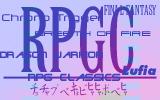
Cidolfas's RPG Reviews: Legend of Mana (PSX)
You Are: A protagonist who lacks a name, a backstory, a voice or indeed any kind of personality at all.
Your Goal Is: To use your imagination, essentially. When the game starts the only place available is your Home. By placing artifacts on the world map, you create new areas to explore.
General System: Legend of Mana has an incredibly diverse set of things to do outside battle. You can plant and harvest fruit; forge equipment or temper it with secondary materials (ranging from fruit to fangs to vials); catch monster eggs and keep them as pets; create golems for battle; or lure elemental spirits by playing music to them and grabbing their coins. The downside to all this is that none of these actions is, strictly speaking, necessary at all. On your first playthrough, you can breeze through the game pretty much just with things you win off enemies or buy with your meagre wallet.
Battle System: Quite simplistic, even for an action RPG. Each battle is self-sustained. You have a party of up to three: yourself, an NPC, and either a pet monster or a golem. You all start with 100% HP, which is refilled after every battle. The battle ends when either your entire party or your enemy's party are dead. Your HP slowly recovers over time. You also have an attack meter that fills up as you attack, and when it's full you can do a special technique (four can be equipped). Your AI-controlled partners have special "synchro effects", like raising defense or healing status, when you're close to them. When one character dies, he comes back to life with 100% HP after a set time. Enemies drop EXP crystals, money, or both; or an item. That's the extent of it. No magic, no items, nothing else besides two fairly useless "skills" you can equip in each battle ranging from a jump to a counterattack. Essentially it's just "attack till they're dead".
Graphics: Stylistically, LoM is a masterpiece. The graphics are colorful without being cartoonish, interesting and lively without being condescending or immature; like the best children's books. Animation is fluid and varied.
Music: One of the best soundtracks available on any system. There are very few letdown tracks. The only drawback is that they tend to be short, leading to much repetition.
Story: There is no single overarching story. Instead, your hero is more of an observer than an active participant (except when monster bashing comes into the equation). You complete events, which are triggered by various criteria, generally by completing other events. There are three main story arcs, all three of which can be completed in a single playthrough; at least four or five "side" story arcs, some interconnected; and a bunch of unrelated events that are just there for fun. The characters are all extremely creative, ranging from anthropomorphic centaurs, sirens, mermaids, cacti, magic circles, monkeys, onions, even teapots!
Characters in the main story arcs actually show surprising nuance and depth, but to keep the metaphor of a "three-dimensional character", there isn't much width to them. They don't get much screen time. There's none of the random conversation that makes more recent RPG offerings so realistic. It's mainly there just to string a theme along, although the themes themselves are definitely worth exploring, more than usual. Still, the gameplay is really the focus of LoM.
Challenge: Normal mode is really easy, but you can set it higher once you finish the game once.
Length: About 30-40 hours to do all events
My Thoughts: I love the style of this game. The gameplay itself is pretty fun, as well. Those are the two biggest joys. However, there are three main qualms I have with it (ignoring the story, which takes a back seat). The first is that the game is too open-ended. Many events give you no hint as to how to advance them; you'll be in one area, something will happen, and you're expected to go somewhere else to continue it, with no idea at all where to go. There's a fortune teller who sometimes gives you half-buried hints, but it's a pain to keep visiting her. Essentially you need to use an FAQ to get anywhere without getting fed up. Similarly, you learn new techniques by equipping particular skills (nearly all of which are useless), but there are no indications of which skills would result in a new technique. The end result is a feeling of being lost all the time.
The second issue is just the idea of challenge. I'm not quite an action afficionado; I've never finished a Megaman game without cheating. But this game was ridiculously easy for me. Much of this had nothing to do with stats; bosses always flash before letting a big skill rip, and if you just get away from then when that happens, the chances of it hitting you are nil. Battles are just too simplistic to require any kind of thought; it's just bash, bash, bash, technique, bash bash bash. That's fine for a plain old action game, but action RPGs require more.
The final big issue is the dungeons; they're too maze-like, without much indication of where you've been and where you need to go. It gets overwhelming. To exacerbate this, this is the only action RPG I can remember where battles were not skippable. It's even worse than random battles, because they always happen. It gets nerve-wracking at times.
End result: Definitely an interesting experience, but there are some big issues that prevent this game from being an instant classic.
Overall Rating: 7/10
|
|


